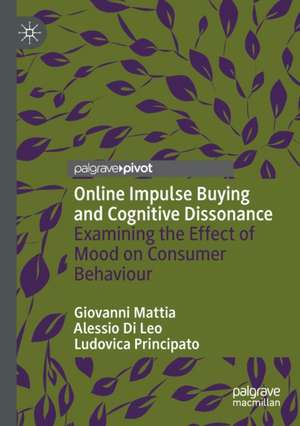Online Impulse Buying and Cognitive Dissonance: Examining the Effect of Mood on Consumer Behaviour
Autor Giovanni Mattia, Alessio Di Leo, Ludovica Principatoen Limba Engleză Paperback – 13 feb 2022
This book offers a deep investigation around online impulse buying and subsequent cognitive dissonance. Specifically, the authors present a research case study of a group of millenials who are shopping for smartphones to study whether an initial positive state can reduce the onset of cognitive dissonance in consumers. Based on substantial research and a sample of 212 impulsive millennial buyers, the book provides a comprehensive, but simple and synthetic framework of impulse buying, cognitive dissonance and positive affect state, highlighting their relationships.
| Toate formatele și edițiile | Preț | Express |
|---|---|---|
| Paperback (1) | 443.36 lei 6-8 săpt. | |
| Springer International Publishing – 13 feb 2022 | 443.36 lei 6-8 săpt. | |
| Hardback (1) | 449.53 lei 6-8 săpt. | |
| Springer International Publishing – 13 feb 2021 | 449.53 lei 6-8 săpt. |
Preț: 443.36 lei
Nou
Puncte Express: 665
Preț estimativ în valută:
84.86€ • 92.21$ • 71.33£
84.86€ • 92.21$ • 71.33£
Carte tipărită la comandă
Livrare economică 21 aprilie-05 mai
Preluare comenzi: 021 569.72.76
Specificații
ISBN-13: 9783030659257
ISBN-10: 3030659259
Pagini: 99
Ilustrații: XI, 99 p. 2 illus.
Dimensiuni: 148 x 210 mm
Greutate: 0.15 kg
Ediția:1st ed. 2021
Editura: Springer International Publishing
Colecția Palgrave Macmillan
Locul publicării:Cham, Switzerland
ISBN-10: 3030659259
Pagini: 99
Ilustrații: XI, 99 p. 2 illus.
Dimensiuni: 148 x 210 mm
Greutate: 0.15 kg
Ediția:1st ed. 2021
Editura: Springer International Publishing
Colecția Palgrave Macmillan
Locul publicării:Cham, Switzerland
Cuprins
1. Introduction.- 2. The impulse buying.- 3. The cognitive dissonance.- 4. The affect state.- 5. Measuring the constructs of impulse buying, cognitive dissonance and affect state.- 6. On-line consumer behavior and technology acceptance models.- 7. Drivers for on-line impulse purchases of highly symbolic products.- 8. Pc-based versus mobile-based on-line shopping.- 9. Millennials and on-line shopping: the case of smartphones.- 10. The study.
Notă biografică
Giovanni Mattia is Associate Professor at Roma Tre University (Rome, Italy), Department of Business Studies, where he currently teaches Consumer Behavior and Marketing Research. His research streams mainly concentrate on consumer behavior and sustainable consumptions. He has been principal investigator of several research projects.
Alessio Di Leo is a Ph.D. Researcher in Marketing at La Sapienza University (Rome, Italy). His research interests refer to the following domains: sustainability issues, consumer behavior, and customer experience in the fields of agri-food and luxury sectors.
Ludovica Principato is Researcher of Marketing and Sustainability at Roma Tre University (Rome, Italy), Department of Business Studies. Her research interests lay on consumer behavior and food waste. In 2013-2014 she was part of the Psychology of Eating and Consumer Health laboratory at the Harvard School of Public Health.
Textul de pe ultima copertă
Consumers’ beliefs and attitudes towards online sales significantly influence buying behavior on the internet. However, the impact of these thoughts and beliefs on the decision to make an online purchase is not direct. It can be moderated by the emotions experienced while browsing an e-commerce website. Impulse buying in particular is influenced by a number of factors, for example how stimulating the e-shopping platform is, and how easy it is to click on the cart a certain product, for instance a smartphone. But what happens after an online impulse buy is made? Often the customer can regret the purchase and in the throes of anxiety, look for reasons to justify the choices made. Consumer behaviour scholars and pyschologists call this phenomenon cognitive dissonance, and certain individuals are more sensitive than others in developing this than others.
This book offers a deep investigation around online impulse buying and subsequent cognitive dissonance. Specifically, the authors present a research case study of a group of millenials who are shopping for smartphones to study whether an initial positive state can reduce the onset of cognitive dissonance in consumers. Based on substantial research and a sample of 212 impulsive millennial buyers, the book provides a comprehensive, but simple and synthetic framework of impulse buying, cognitive dissonance and positive affect state, highlighting their relationships.
Giovanni Mattia is Associate Professor at Roma Tre University (Rome, Italy), Department of Business Studies, where he currently teaches Consumer Behavior and Marketing Research. His research streams mainly concentrate on consumer behavior and sustainable consumptions. He has been principal investigator of several research projects.
Giovanni Mattia is Associate Professor at Roma Tre University (Rome, Italy), Department of Business Studies, where he currently teaches Consumer Behavior and Marketing Research. His research streams mainly concentrate on consumer behavior and sustainable consumptions. He has been principal investigator of several research projects.
Alessio Di Leo is a Ph.D. Researcher in Marketing at La Sapienza University (Rome, Italy). His research interests refer to the following domains: sustainability issues, consumerbehavior, and customer experience in the fields of agri-food and luxury sectors.
Ludovica Principato is Researcher of Marketing and Sustainability at Roma Tre University (Rome, Italy), Department of Business Studies. Her research interests lay on consumer behavior and food waste. In 2013-2014 she was part of the Psychology of Eating and Consumer Health laboratory at the Harvard School of Public Health.
Caracteristici
Explore the drivers for on-line impulse buying Explain the effect of mood on cognitive dissonance after an on-line impulse buying Provides implications for practitioners as well as academics
